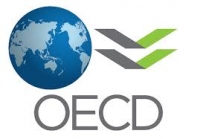Economists Ponder Are We In Recession?
Sunday 21 February, 2016 Written by POLITICO
OECD calls for less austerity in bleak forecast:
Open up the spending spigot. The message from the Organization for Economic Cooperation and Development to world leaders could not have been clearer on Thursday. The OECD slashed growth forecasts for all the G7 countries and the world economy. All the more remarkable since its previous predictions were just three months ago. Global growth is now projected at 3 percent in 2016, no faster than in 2015, its slowest pace in five years.
Technical but important fact: Many economists think that the world is in a recession if it grows at around 3 percent. So we are on the brink. The definition is different from the one for national economies (two consecutive quarters of negative growth) to account for the fact that there are many poor countries in the world that grow fast but from a low base.
What to do? OECD Chief Economist Catherine L. Mann was explicit: “A stronger collective policy approach is urgently needed, focusing on a greater use of fiscal and pro-growth structural policies, to strengthen growth and reduce financial risks.”
The OECD proposes “changing the policy mix” — a key phrase meaning less austerity and more spending. “The focus should be on policies with strong short-run benefits and that also contribute to long-term growth. A commitment to raising public investment would boost demand and help support future growth,” Mann said.
The U.K. response: Not wholly convinced about the need to ditch austerity measures. Here is what Osborne said (the italics are mine): “In a turbulent economic climate, we need to show resilience and resolve and keep taking the action necessary to restore order to the public finances and deliver economic security for working people
Meanwhile:
Osborne’s approval rating falls: Bloomberg’s Svenja O’Donnell: “Forty percent of people surveyed by Ipsos Mori are happy with his stewardship of the economy, down 4 percentage points from July. Forty-six percent are dissatisfied, giving the chancellor his first negative rating — minus 6 — since 2013. Prime Minister David Cameron’s satisfaction rating fell to minus 15.”
NOTE: From Wikipedia The Organisation for Economic Co-operation and Development (OECD) (French: Organisation de coopération et de développement économiques, OCDE) is an international economic organisation of 34 countries, founded in 1961 to stimulate economic progress and world trade. It is a forum of countries describing themselves as committed to democracy and the market economy, providing a platform to compare policy experiences, seeking answers to common problems, identify good practices and coordinate domestic and international policies of its members.
Leave a comment
Make sure you enter all the required information, indicated by an asterisk (*). HTML code is not allowed.
Join
FREE
Here










